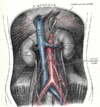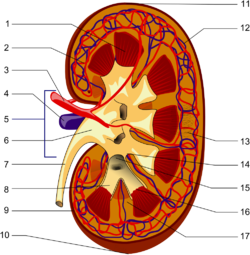
Renal circulation
Encyclopedia


Cardiac output
Cardiac output is the volume of blood being pumped by the heart, in particular by a left or right ventricle in the time interval of one minute. CO may be measured in many ways, for example dm3/min...
. It branches from the abdominal aorta
Abdominal aorta
The abdominal aorta is the largest artery in the abdominal cavity. As part of the aorta, it is a direct continuation of the descending aorta .-Path:...
and returns blood to the ascending vena cava. It is the blood supply to the kidney
Kidney
The kidneys, organs with several functions, serve essential regulatory roles in most animals, including vertebrates and some invertebrates. They are essential in the urinary system and also serve homeostatic functions such as the regulation of electrolytes, maintenance of acid–base balance, and...
, and contains many specialized blood vessels.
Circulation
The table below shows the path that blood takes when it travels through the glomerulus, traveling "down" the arteries, and "up" the veins. However, this model is greatly simplified for clarity and symmetry. Some of the other paths and complications are described at the bottom of the table.INTERLOBAR ARTERY & VEIN (not to be confused with interlobular) are between 2 renal lobes, also known as the renal column (cortex region between two pyramids).
| Arteries (down) | Veins (up) |
|---|---|
| Abdominal aorta Abdominal aorta The abdominal aorta is the largest artery in the abdominal cavity. As part of the aorta, it is a direct continuation of the descending aorta .-Path:... |
Vena cava |
| Renal artery Renal artery The renal arteries normally arise off the side of the abdominal aorta, immediately below the superior mesenteric artery, and supply the kidneys with blood. Each is directed across the crus of the diaphragm, so as to form nearly a right angle with the aorta.... (Note 1) |
Renal vein Renal vein The renal veins are veins that drain the kidney. They connect the kidney to the inferior vena cava.It is usually singular to each kidney, except in the condition "multiple renal veins".It also divides into 2 divisions upon entering the kidney:... |
| Segmental arteries (Note 2) | - |
| Lobar arteries | - |
| Interlobar artery | Interlobar vein |
| Arcuate arteries Arcuate arteries of the kidney The arcuate arteries of the kidney are vessels of the renal circulation. They are located at the border of the renal cortex and renal medulla.They are named after the fact that they are shaped in arcs due to the nature of the shape of the renal medulla.... |
Arcuate vein Arcuate vein The arcuate vein is a vessel of the renal circulation. It is located at the border of the renal cortex and renal medulla.-External links: - "Urinary System: neonatal kidney, vasculature" - "Urinary System: kidney, PAS stain, arcuate artery and vein, longitudinal" - "Urinary System: kidney, PAS... |
| Interlobular artery (Note 3) | Interlobular vein |
| Afferent arterioles Afferent arterioles The afferent arterioles are a group of blood vessels that supply the nephrons in many excretory systems. They play an important role in the regulation of blood pressure as a part of the Tubuloglomerular feedback mechanism.... |
Efferent arterioles (Note 4) |
| Glomerulus Glomerulus A glomerulus is a capillary tuft that is involved in the first step of filtering blood to form urine.A glomerulus is surrounded by Bowman's capsule, the beginning component of nephrons in the vertebrate kidney. A glomerulus receives its blood supply from an afferent arteriole of the renal... |
Glomerulus Glomerulus A glomerulus is a capillary tuft that is involved in the first step of filtering blood to form urine.A glomerulus is surrounded by Bowman's capsule, the beginning component of nephrons in the vertebrate kidney. A glomerulus receives its blood supply from an afferent arteriole of the renal... |
- Note 1: The renal arteryRenal arteryThe renal arteries normally arise off the side of the abdominal aorta, immediately below the superior mesenteric artery, and supply the kidneys with blood. Each is directed across the crus of the diaphragm, so as to form nearly a right angle with the aorta....
also provides a branch to the inferior suprarenal arteryInferior suprarenal arteryEach renal artery gives off some small inferior suprarenal branches to the suprarenal gland, the ureter, and the surrounding cellular tissue and muscles....
to supply the adrenal glandAdrenal glandIn mammals, the adrenal glands are endocrine glands that sit atop the kidneys; in humans, the right suprarenal gland is triangular shaped, while the left suprarenal gland is semilunar shaped...
. - Note 2: Each renal artery partitions into an anterior and posterior branch. The anterior branch further divides into the superior (apical), anterosuperior, anteroinferior and inferior segmental arteries. The posterior branch continues as the posterior segmental artery.
- Note 3: The interlobular artery also supplies to the stellate veinsStellate veinsThe veins beneath the fibrous tunic of the kidney, stellate veins are stellate in arrangement, and are derived from the capillary network, into which the terminal branches of the interlobular arteries break up. These join to form the interlobular veins, which pass inward between the rays....
. - Note 4: The efferent arterioles don't directly drain into the interlobular vein, but rather they go to the peritubular capillariesPeritubular capillariesIn the renal system, peritubular capillaries are tiny blood vessels that travel alongside nephrons allowing reabsorption and secretion between blood and the inner lumen of the nephron....
first. The efferent arterioles of the juxtamedullary nephronJuxtamedullary nephronA juxtamedullary nephron is a type of nephron, found only in birds and mammals and not in other vertebrates. The "medullary" is referring to the renal medulla, while the "juxta", , refers to the relative position of the renal corpuscle, which in these nephrons is near the medulla...
drain into the vasa rectaVasa rectaIn the blood supply of the kidney, the vasa recta renis form a series of straight capillaries in the medulla...
.

